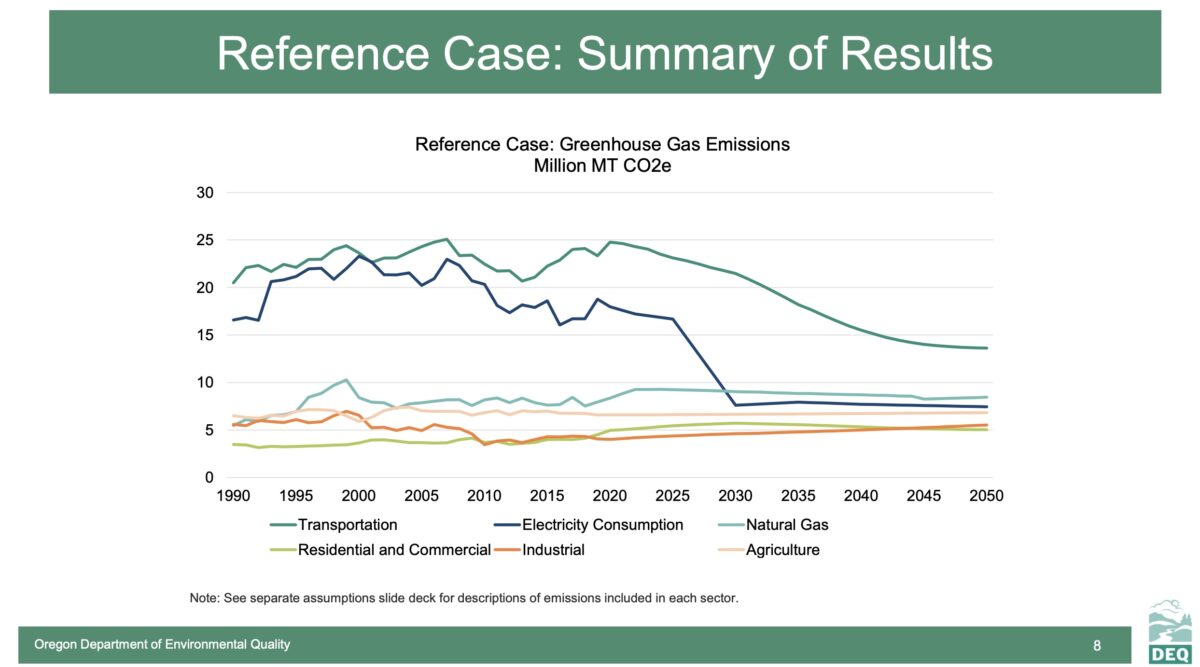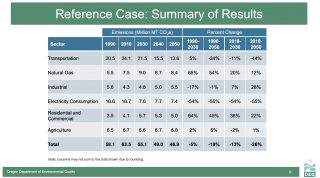
Today the Intergovernmental Panel on Climate Change issued a dread-inducing, landmark report and said we face “a code red for humanity” because we have not done enough to limit the use of fossil fuels and the earth is heating up quickly as a result. Four days ago the Oregon Department of Environmental Quality released a set of draft rules that would give regulators a fighting chance to do something about it.
The DEQ’s new Climate Protection Program includes a suite of proposed rules that aim to limit greenhouse gas emissions from significant sources in Oregon. The rules would be the most ambitious and holistic approach ever taken by the State of Oregon to battle the climate crisis. The rules, which still face a 60-day public comment period and subsequent approval by the four member Environmental Quality Commission, would set caps on emissions and allow polluters to trade or take offsetting actions if/when they go beyond them.
“We all have witnessed the growing and horrific effects of climate change across Oregon and the nation,” said DEQ Director Richard Whitman, in a press release. “These new programs put Oregon on a path to doing its part to avoid the worst effects of climate change.”
As currently written, the rules would establish enforceable limits on GHG emissions that would be lowered every year until Oregon reached an 80% reduction by 2050. The rulemaking effort focuses on emissions from the manufacturing, distribution and sales of fossil fuels. (Emissions from electricity generation are not part of this new program).
Advertisement

DEQ has worked on the rules for almost two years with a 35-member advisory committee that has met seven times since January 2021. The committee includes advocates from environmental and social justice organizations, energy and timber companies, tribes, public health experts, trucking interests, business lobbyists, and so on.
In addition to setting limits on GHG emitters, the program will allow regulated fuel suppliers to meet their reduction limits by supporting clean energy projects in low-income and communities of color.
DEQ hired a consulting company to analyze how four different GHG reduction scenarios would impact the economy, air quality, and public health. (See a PDF of the results here.) They found all scenarios would result in: substantial cumulative monetized health benefits of about $2 billion; minimal economic impacts with a net positive trend for gross state product, jobs and income; and positive benefits for communities of concern.
On June 25th over two dozen individuals and organizations from the Climate Protect Program Rulemaking Advisory Committee signed onto a letter (PDF) that outlines serious concerns about the draft rules. They want a guarantee of stronger emissions caps, fewer loopholes for polluters, and more oversight of stationary sources like electricity producers.
Yamhill County Commissioner Casey Kulla, who recently visited Portland to do a few Pedalpalooza rides, signed the letter. “In light of the IPCC report I hope that the Environmental Quality Commission will really look at the strength of that letter when considering whether to adopt these draft rules.” Kulla is a farmer when he’s not being an elected official, and says this year’s past and coming heat waves give him grave concerns. “As somebody who farms and works with people who are growing stuff, we are right on the edge,” he shared with BikePortland today. “I know farmers who consider the smoke (from fires) as an existential threat.”
As for his fellow rural residents who have opposed Oregon Governor Kate Brown’s attempts at environmental legislation, Kulla says, “I feel like this is the opportunity for farmers who may have supported the Timber Unity walkout to be like, ‘We get another chance.'”
Whether Oregon has a chance to move the needed on GHG emissions could depend largely on the strength of these rules. If you’re looking to take action in your own backyard, check out the DEQ Climate Protection Program website and be sure to share your comments before October 4th.
— Jonathan Maus: (503) 706-8804, @jonathan_maus on Twitter and jonathan@bikeportland.org
— Get our headlines delivered to your inbox.
— Support this independent community media outlet with a one-time contribution or monthly subscription.

